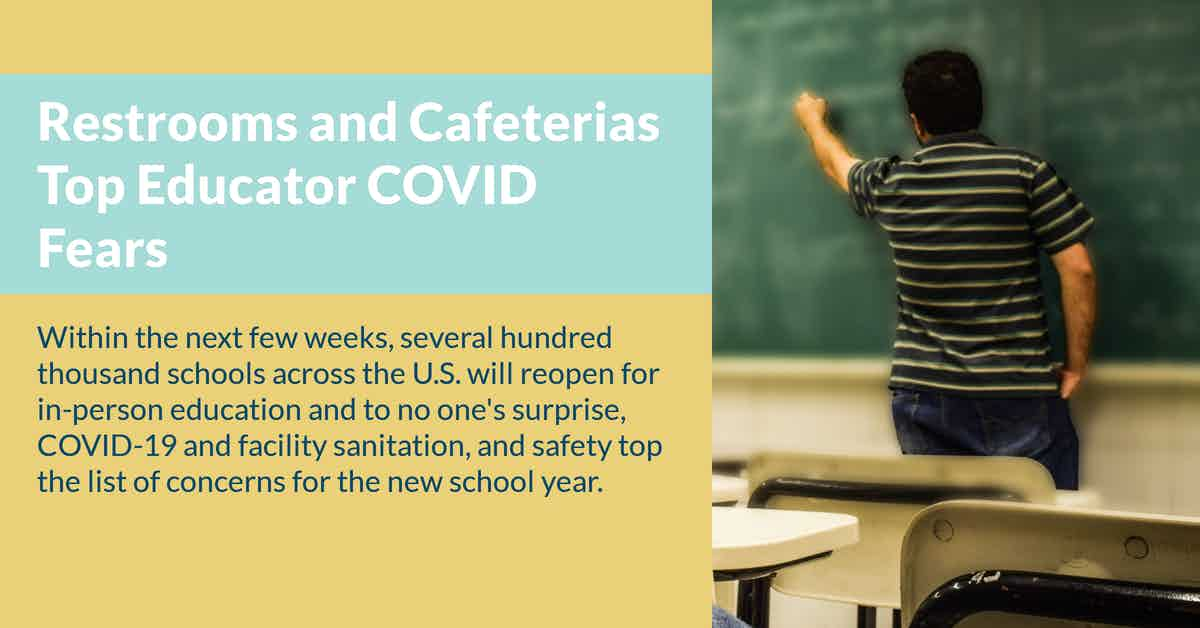Within the next few weeks, several hundred thousand schools across the U.S. will reopen for in-person education, and to no one's surprise, COVID-19 and facility sanitation and safety top the list of concerns for the new school year.

Facility Cleanliness Top COVID Fears for the New School Year
Schools across the country, if they have not already, will open their doors to in-person education for the first time since quarantine and shelter in place orders went out several months ago.
Unsurprisingly, many educators have voiced concerns regarding facility hygiene and district custodial practices.
According to a recent OpenWorks survey, more than 200 educators across the country were asked to identify their primary facility sanitation concerns.
Of the responses;
- 89% cited bathrooms.
- 81% said cafeterias.
- 77% were concerned about busses.
- 71% listed locker rooms.
- 70% mentioned computer labs.
- Only 67% said regular classrooms.
- 66% stated gyms were their primary concern, and, surprisingly;
- 66% cited playgrounds.
Respondents were also asked to identify the surfaces they felt were most likely contaminated or that concerned them the most.
- 90% identified door handles.
- 81% listed drinking fountains and water station areas.
- 80% cited desks.
- 76% mentioned railings.
- 75% said computers.
- 67% were concerned with gym equipment and classroom supplies.
- Only 66% brought up light switches, and, surprisingly again;
- 54% said playground equipment.
When asked how their district planned to address COVID concerns;
92% plan to increase the frequency of their cleaning and disinfecting efforts, and more than half of them will increase these efforts to multiple times a day.
79% plan to follow social distancing measures, yet only 59 percent plan to reduce the number of students in the classroom.
74% are ensuring all educators and staff wear masks and 64 percent are ensuring all students wear masks.
58% of educators are ensuring their school buses are cleaned and disinfected.
45% are hiring additional maintenance and janitorial staff or increasing their hours to clean and disinfect more frequently.
39% are planning to have their indoor air systems (heating, ventilation, and cooling) inspected or upgraded prior to their schools reopening to students.
38% are hiring additional outside cleaning and disinfection crews to clean and disinfect more frequently.
Educators Believe Restrooms, Cafeterias Present Biggest Germ Risk
Addressing Educator COVID Concerns
Educator fears regarding classroom cleanliness and facility sanitation can be broken up into four specific sections requiring four distinct strategies:
- No-touch scrubber-vacs in bathrooms, locker rooms, and kitchens.
- Electrostatic disinfection in classrooms, labs, lockers, and cafeterias.
- Touchpoint disinfection for germ hotspots, and;
- Enhanced cleaning for outdoor areas and playground equipment.
No-touch scrubber vacs include low-pressure spray wash attachment and non-electrostatic disinfectant sprayers, and they are ideal for facility spaces with hard surfaces that can benefit from deep, penetrating cleans.
Electrostatic disinfection appliances are the perfect choice for spaces with numerous surfaces and surface types where full surface coverage is desirable but difficult to achieve, such as classrooms filled with desks, computer labs, busses, locker rooms, and gyms.
Wiping down identified high-contact touchpoints several times during the day will significantly reduce the spread of pathogens, and one of the best methods for addressing that, especially in the classroom, is to equip and train educators with cleaning and disinfection kits.
Alternatively, employing day porters to rove around and clean and disinfect areas throughout the school according to occupancy and use will allow for some semblance of distraction-free education time.
The last area and strategy involve outdoor and playground equipment.
SARS-CoV-2 is highly susceptible to UV and has a low survival rate outside on surfaces that are exposed to direct sunlight.
As such, standard cleaning with regular soap-based detergents and microfiber cloths are more than sufficient for eliminating the presence of most germs.
References & Resources
- Educator Back to School Survey
- U.S. Educators Report That School Bathrooms, Cafeterias, and Buses Require the Most Cleaning and Disinfection; They Also Indicate That Door Handles, Drinking Fountains, and Desks Are More Prone to Germs
Takeaway
A return to school, though difficult, is necessary to provide critical services to students, many of whom rely heavily on meals and other services provided by the district to maintain their physical, mental, and emotional health.
Based on educator concerns, no-touch enhanced cleaning and electrostatic disinfection appliances combined with regular fomite disinfection can provide a safe and healthy work and learning environment.
If you would like more information regarding the effectiveness of high-performance infection prevention and control measures, or if you would like to schedule a free, no-obligation onsite assessment of your facility's custodial needs, contact us today for a free quote!
In Bakersfield CA, call (661) 437-3253
In Fresno CA, call (559) 206-1059
In Valencia CA, or Santa Clarita CA, call (661) 437-3253
In Palmdale CA, or Lancaster CA, call (661) 371-4756

